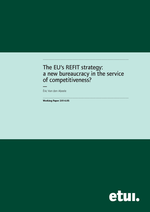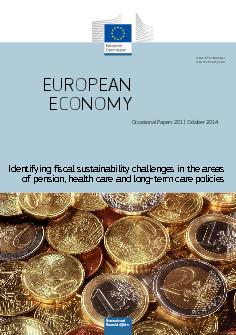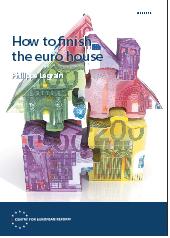Preston, Ι. (2014) “The effect of immigration on public finances“, VoxEU Organisation, 05 November. Data on social attitudes show that the perceived burden of immigration on a nation’s public finances is one of the strongest economic concerns associated with hostility to immigration. Yet recent official reports suggest an important positive role for immigration in the long-run health of public finances. This column argues that there can be no general …Read More
The EU’s REFIT strategy: a new bureaucracy in the service of competitiveness?
Van den Abeele, E. (2014) “The EU’s REFIT strategy: a new bureaucracy in the service of competitiveness?“, European Trade Union Institute (ETUI), Working Paper 2014.05, October. This Working Paper provides a clear but critical assessment of the EU’s process of simplification and qualitative improvement of the ‘acquis’, a process originally known as ‘Better Law-making’, subsequently as ‘Smart regulation’ and, in its latest incarnation, as ‘Regulatory Fitness and Performance (REFIT)’. …Read More
Why France Needs Political Reform
Funk Kirkegaard, J. (2014) “Why France Needs Political Reform“, Peterson Institute for International Economics, 29 October. Despite recent unflattering jokes, France is not an economic basket case. Blessed with numerous competitive high value-added industries, France is also visited by more foreign tourists than any other country in the world. It has also performed far better than the euro area periphery and the islands off the coast of the Continent …Read More
Making sense of the comprehensive assessment
Acharya, V. & Steffen, S. (2014) “Making sense of the comprehensive assessment“, VoxEU Organisation, 29 Οκτωβρίου. The ECB conducted a comprehensive assessment of banks and identified capital shortfalls for 25 banks, totalling €25 billion. In this column, the authors provide a number of benchmark stress tests to estimate capital shortfalls. The analyses suggest possible capital shortfalls between €80 billion and more than €700 billion depending on the model. They …Read More
Eurozone battle lines being drawn again with Germany on the other side
Mitchell, B. (2014) “Eurozone battle lines being drawn again with Germany on the other side“, Bill Mitchell Blog: Modern Monetary Theory – Macroeconomic Reality, 27 October. The battlelines between the European Commission and France and Italy over the – Corrective arm – of the Stability and Growth Pact are firming up after the Italian Government publicly released a ‘strictly confidential’ letter from the Vice President of the European Commission …Read More
Maximising happiness does not maximise welfare
Glaeser, Ε., Gottlieb, J. & Ziv, O. (2014) “Maximising happiness does not maximise welfare“, VoxEU Organisation, 15 October. Governments are now measuring happiness, or subjective wellbeing, and some have begun trying to maximise it. This column discusses recent research showing that happiness is not the same thing as utility. The choices people make suggest that they have desires and objectives other than happiness. It is therefore possible to make …Read More
Identifying fiscal sustainability challenges in the areas of pension, health care and long-term care policies
Eckefeldt, P., Schwierz, C., Giamboni, L., Aarnout, M. & Carone, G. (2014) “Identifying fiscal sustainability challenges in the areas of pension, health care and long-term care policies“, European Economy – Occasional Papers, No. 201, European Commission: Economic and Financial Affairs, October. This paper presents a horizontal assessment framework used by the Commission services to identify structural-fiscal reforms that are deemed necessary to address fiscal sustainability challenges in the Member …Read More
Taking a bite out of Apple? Fixing international corporate taxation
De Mooij, R., Keen, M. & Perry, V. (2014) “Taking a bite out of Apple? Fixing international corporate taxation“, VoxEU Organisation, 14 September. Multinational companies’ ability to pay little corporate income tax has grabbed headlines recently. This column argues that the details of international tax rules matter for macroeconomic performance – especially in low-income countries. This emphasises the importance of the G20–OECD Action Plan on Base Erosion and Profit …Read More
How to Finish the Euro House
Legrain, P. (2014) “How to Finish the Euro House“, Centre for European Reform (CER), June. The euro is a half-built house whose foundations have been weakened by successive policy mistakes. Battered by a financial hurricane, it has been patched up, altered and extended repeatedly in recent years. Even so, it became so dangerously unstable that it came to the brink of collapse. Finally, in the summer of 2012 the …Read More
Keynes and the International Clearing Union: A Possible Model for Eurozone Reform?
Whyman, P. B. (2014) “Keynes and the International Clearing Union: A Possible Model for Eurozone Reform?“, JCMS: Journal of Common Market Studies. doi: 10.1111/jcms.12180, 07 August. Economic and monetary union in Europe, as currently constituted, has a number of structural weaknesses. Large, persistent international payments imbalances necessitate deficit nations to deflate their economies or squeeze social wages in order to restore competitiveness. Surplus nations accrue reserves, with little pressure to …Read More








